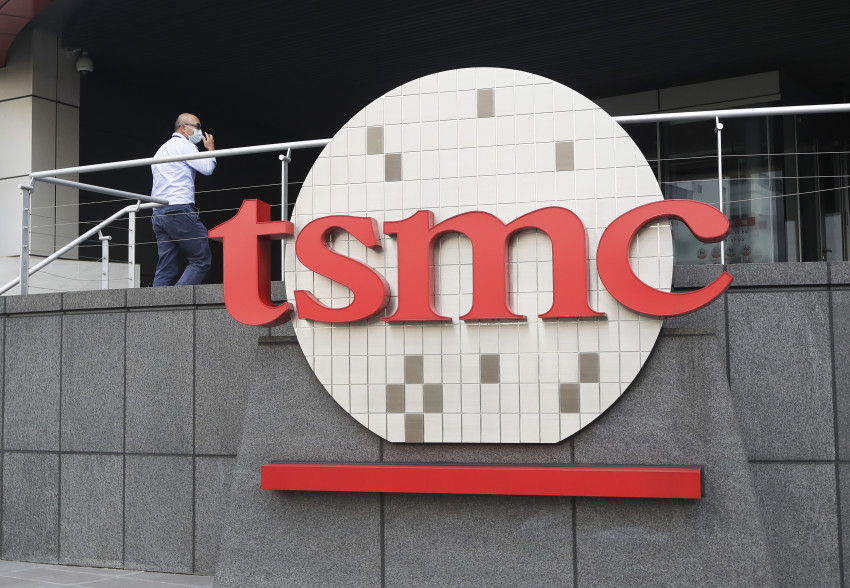|
Getting your Trinity Audio player ready...
|
Taiwan Semiconductor Manufacturing Co, the world’s largest contract chipmaker, experienced a significant decline in its share value on Friday, dropping more than 3%. The sharp dip in share prices came after the company issued a warning about a projected 10% drop in sales for the year 2023. Additionally, TSMC revealed that the launch of its first manufacturing plant in Arizona, initially scheduled for next year, will be delayed.
In its recent earnings report released on Thursday, TSMC disclosed a 23% decrease in net profit for the second quarter of the year. This marks the first year-on-year decline in quarterly profit since 2019 for the chipmaker. The decrease in profit can be attributed to the ongoing global economic challenges that have severely impacted the demand for chips utilized in various industries, from automotive to mobile devices.
Despite these challenges, Brady Wang, Associate Director at Counterpoint Research, remains optimistic about TSMC’s long-term growth prospects. Wang asserted that TSMC’s decline in revenue and profit was disappointing; however, the company is well-positioned for the future due to the prevailing mega-trends, particularly the continued adoption of 5G technology and high-performance computing.
As TSMC seeks to expand its global footprint, the company reported that the production schedule for its Arizona plant will be postponed until 2025. The delay is attributed to a shortage of specialized workers in the region. TSMC’s chairman, Mark Liu, stated that efforts are underway to address the situation, including training local skilled workers with assistance from experienced technicians from Taiwan. The plant in Arizona is part of a substantial investment, totaling $40 billion, by the company in the United States.
Despite being the largest manufacturer of artificial intelligence (AI) chips, TSMC acknowledged that the high demand for AI chips has not been sufficient to offset the broader weakness in the end market, given the slower-than-expected global economic recovery.
Liu emphasized the unpredictable nature of short-term AI demand and cautioned against extrapolating short-term trends to the long term. He stated that it remains uncertain how the sudden surge in AI demand will evolve in the near future, especially in the following year.
Nevertheless, TSMC’s earnings for the second quarter, amounting to 181.8 billion Taiwan dollars ($5.85 billion), exceeded expectations. This positive performance has prompted Goldman Sachs to express confidence in TSMC’s growth outlook for 2024, and the delay in the US expansion was reportedly anticipated by investors.
Citi Research analysts echoed the positive sentiment, emphasizing TSMC’s dominant position in AI chip manufacturing, which currently accounts for approximately 6% of the company’s revenue. They anticipate a strong outlook for the company beyond 2024, driven by sustained demand for AI chips.
Despite the current setbacks, industry experts and analysts remain bullish on TSMC’s long-term potential and foresee the company continuing to play a pivotal role in shaping the future of the semiconductor industry.
TSMC’s Response and Road Ahead
In response to the challenges, TSMC has taken proactive measures to address the skilled workforce shortage at its Arizona plant. The decision to send experienced technicians from Taiwan to train local workers indicates the company’s commitment to overcoming the delay and ensuring a successful launch in 2025. This strategic move aligns with TSMC’s dedication to the US expansion project, which aims to establish a stronger presence in the American semiconductor market.
As the company faces uncertainties surrounding short-term AI demand, TSMC remains confident in its long-term growth trajectory. Leveraging its position as a leader in AI chip manufacturing, the company intends to capitalize on the sustained demand for advanced AI solutions. With AI technology increasingly integrated into various industries, TSMC’s expertise in this field is expected to be a significant driver of growth in the years ahead.
Moreover, TSMC’s solid earnings for the second quarter have reassured investors and analysts alike. The company’s ability to surpass expectations, even in the face of a challenging market environment, further reinforces its reputation as a resilient and innovative player in the semiconductor industry.
Looking forward, TSMC has positioned itself to seize opportunities presented by emerging technologies, such as 5G, the Internet of Things (IoT), and high-performance computing. These technological advancements are anticipated to drive substantial demand for cutting-edge semiconductor solutions, which aligns well with TSMC’s expertise and capabilities.
The company’s strategic investments and expansion plans also align with broader global trends in digital transformation and the growing demand for semiconductor chips in a variety of sectors. As industries continue to evolve and innovate, TSMC’s pivotal role as a leading contract chipmaker is expected to be further solidified.
Despite the challenges posed by the delayed Arizona plant opening and the ongoing impact of the global economic slowdown on chip demand, TSMC’s long-term outlook remains positive. The company’s prudent management, strong financial performance, and unwavering commitment to innovation and research and development (R&D) make it a key player in shaping the future of the semiconductor industry.
As the world continues to rely on advanced technologies to drive progress in various domains, TSMC’s contributions are poised to play a vital role in enabling cutting-edge devices and applications that will shape our digital future.
Investors, industry experts, and tech enthusiasts will closely watch TSMC’s strategies and developments in the coming quarters as the company navigates the dynamic landscape of the semiconductor industry. With its proven track record and dedication to pushing the boundaries of technology, TSMC is well-positioned to weather the current challenges and emerge stronger on the path to continued growth and innovation.
Government Support and Industry Collaboration
TSMC’s expansion plans in the United States have garnered significant attention from policymakers and industry stakeholders. The US government has been actively supporting efforts to strengthen domestic semiconductor manufacturing capabilities, recognizing the strategic importance of semiconductor technology in various critical sectors, including national security, communications, and transportation.
The delay in the Arizona plant’s opening has also highlighted the importance of workforce development in the semiconductor industry. In response to this challenge, industry players, educational institutions, and government bodies are expected to collaborate more closely to nurture a skilled workforce that can meet the demands of an ever-evolving technological landscape.
The ongoing shortage of semiconductor chips has shed light on the need for enhanced supply chain resilience. TSMC’s global expansion, including the Arizona plant, is likely to play a role in diversifying the supply chain and reducing vulnerabilities associated with a concentration in specific regions.
Furthermore, TSMC’s commitment to the US project and its multi-billion dollar investment reflects the company’s confidence in the long-term growth potential of the American market. This move is likely to strengthen TSMC’s partnerships with US-based companies and contribute to technological advancements within the country.
Competitive Landscape and Potential Challenges
While TSMC remains a dominant force in the semiconductor industry, competition in the global market is intensifying. Rival companies, particularly those from China and South Korea, are aggressively investing in their semiconductor capabilities and striving to challenge TSMC’s leadership position.
In addition to competition, the semiconductor industry faces other challenges, such as geopolitical tensions, trade disputes, and supply chain disruptions. These factors could impact the demand for chips and the overall growth prospects for the industry.
Moreover, the cyclical nature of the semiconductor market means that demand for chips can fluctuate based on economic conditions and market dynamics. As a result, TSMC must continue to adapt and innovate to maintain its competitive edge and navigate through market uncertainties.
Conclusion
Despite short-term challenges and the delay in the Arizona plant’s opening, Taiwan Semiconductor Manufacturing Co remains a key player in the global semiconductor landscape. The company’s unwavering focus on R&D, commitment to emerging technologies, and strategic investments position it favorably for future growth.
TSMC‘s solid financial performance in the face of market headwinds, along with optimistic outlooks from analysts, underscores the company’s resilience and potential for sustained success. As the world increasingly relies on advanced technologies, TSMC’s contributions will be instrumental in driving innovation and shaping the digital future.
While uncertainties persist, TSMC’s long-term growth prospects remain promising, backed by the proliferation of 5G, AI, IoT, and high-performance computing. As the semiconductor industry continues to play a critical role in transforming various sectors, TSMC’s role as a trailblazer in chip manufacturing is set to become even more vital.
Investors and stakeholders will be closely observing TSMC’s performance and strategic moves in the coming months and years. As the company continues to navigate through challenges and capitalize on opportunities, its leadership in the semiconductor market is poised to define the trajectory of the industry for years to come.



